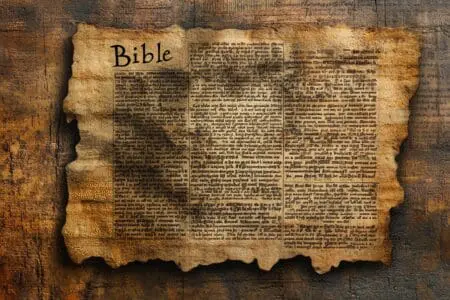Ever fall down a rabbit hole? That was me last week. It started with a simple question I couldn’t shake: Is Job the oldest book in the Bible? I’d always just assumed everything was in chronological order, you know? Genesis first, then Exodus, and so on. It just seemed logical. But the more I looked into it, the more I realized my tidy assumption was completely wrong.
The Bible isn’t arranged like a history textbook, from oldest to newest. It’s grouped by genre—law, history, poetry, prophecy. Job is tucked away right at the start of the poetry section, but its story feels ancient, like it’s from a different world entirely. There’s no mention of Moses, the Ten Commandments, or the nation of Israel. It’s just this one man, his suffering, and his raw, unfiltered conversation with God.
It’s a genuine historical puzzle. Answering it isn’t as simple as finding a date stamped on the first page. We have to become detectives, looking for clues hidden in the language, the culture, and the very ideas the book wrestles with. So, grab a coffee, and let’s dig into this together. What I found was way more fascinating than I ever expected.
More in Bible Category
How Many Words Are in the KJV Bible
Key Takeaways
For those of you who want the short version, here it is:
- The Story is Probably the Oldest: Most scholars agree that the events in the story of Job are set in the Patriarchal Age, around the time of Abraham (roughly 2000-1800 B.C.). This makes the story itself one of the oldest narratives in the entire Bible.
- The Writing is a Different Matter: Just because the story is ancient doesn’t mean the book was the first one written down. The actual composition of the book of Job is heavily debated. Some experts believe it was written down as early as the time of Solomon (around 950 B.C.), while others argue it was much later, during the Babylonian Exile (around 586 B.C.).
- Why the Confusion? The book’s language is unique and complex, its poetic structure is masterful, and its themes are timeless. These features make it difficult to pin down to a single historical period. It feels both incredibly ancient and surprisingly modern.
- The Verdict: Is Job the oldest book in the Bible? The story’s setting is almost certainly the oldest. The written book? Probably not the absolute oldest, but it’s definitely one of the most ancient pieces of literature we have, period.
So, What’s the Big Deal About When It Was Written?
You might be thinking, “Does it really matter?” And that’s a fair question. I asked myself the same thing. It’s not like knowing the exact date changes the book’s powerful message about suffering and faith.
But I think it does matter, for a couple of reasons.
First, understanding the context gives the book a whole new layer of depth. If you imagine it being written during a time of peace and prosperity, like during King Solomon’s reign, the questions about suffering feel philosophical and preventative. It’s a prosperous society wrestling with the “what if” a disaster happened.
But if you picture it being written when the Israelites were captives in Babylon, their temple destroyed and their nation shattered… well, suddenly Job’s personal tragedy becomes a national one. His questions about God’s justice aren’t just theoretical anymore. They’re the desperate, tear-stained questions of an entire people. The historical backdrop completely changes the emotional weight of the story.
Second, it speaks to the book’s incredible staying power. If the story has been told and retold for thousands of years, from ancient campfires to the courts of kings, it means the questions Job asks are fundamental to being human. They’re the same questions we ask today when life throws us a curveball. It connects us, across millennia, to this man who demanded answers from the heavens.
Wait, Doesn’t Genesis Come First?
This was my first question. Genesis is literally the book of beginnings. It’s right there at the front, page one. So how could anything be older?
This is where we need to separate the timeline of the events from the timeline of the writing. The events in Genesis, starting with creation and moving through Abraham, Isaac, and Jacob, are indeed the earliest events recorded in the Bible. No one disputes that.
But most scholars believe the book of Genesis, as we have it today, was compiled and written down by Moses around 1450-1400 B.C. He was drawing on a rich history of oral traditions—stories passed down from generation to generation—but he was the one who put it all together in the form we now read.
The case for Job’s antiquity rests on the idea that its story takes place before Moses and the Law. Let’s look at the clues inside the book itself.
What Clues Point to an Ancient Setting?
When you read Job, it feels like stepping into a different era compared to the books that follow it. It’s like watching a movie set in the Old West; you know from the horses and the lack of cars that it’s from a different time. Here are some of the “horses and buggies” you find in the book of Job:
- Job’s Lifespan: At the end of the book, it says Job lived another 140 years. This puts his total lifespan in the neighborhood of 200 years, similar to the long lives of the patriarchs described in Genesis. After the time of Moses, lifespans in the Bible get much shorter.
- His Wealth: How is Job’s wealth measured? Not in gold or silver, but in livestock. “Seven thousand sheep, three thousand camels, five hundred yoke of oxen…” This is classic of the semi-nomadic patriarchal period, the same way Abraham’s wealth was measured.
- He’s His Own Priest: Job offers sacrifices on behalf of his family. After the Law of Moses was given, this was strictly forbidden. Only the designated priests from the tribe of Levi could offer sacrifices. The fact that Job does this himself, with no mention of a priesthood or a Tabernacle, places the story firmly in a pre-Mosaic world.
- The Name of God: While the name Yahweh (or Jehovah) does appear in the book, a more common name used for God is “Shaddai” (Almighty). This name is also frequently associated with the patriarchs Abraham, Isaac, and Jacob in the book of Genesis.
All these little details paint a consistent picture: the world Job lived in was the world of the patriarchs, not the nation of Israel.
Okay, The Story is Old. But What About the Book Itself?
This is where things get complicated, and where the real debate happens. Just because a story is set in 2000 B.C. doesn’t mean it was written down then. Think about all the movies made today about World War II. The story is from the 1940s, but the script was written last year.
The same principle could apply to Job. The core story of the righteous man who suffers could have been a well-known oral tradition for centuries before someone decided to write it down in the magnificent poetic form we have today.
So, when did the writing happen? The honest answer is: nobody knows for sure. But there are three main theories that scholars debate, and the evidence for each is pretty interesting.
Theory 1: It Was Written Early, Around the Time of Solomon
This is the more traditional view. The argument here is that the book was written during Israel’s golden age, around 950 B.C.
- Why it makes sense: This was a time of great literary achievement in Israel. The wisdom literature, like Proverbs and Ecclesiastes, was flourishing. The sophisticated, complex poetry of Job would fit right into this vibrant intellectual environment. It was a time of relative peace and prosperity, which often leads people to ponder the deeper questions of life and justice. It’s easier to ask, “Why do bad things happen to good people?” when things are, for the most part, pretty good.
- The evidence: The style of the wisdom literature from this period shares some themes with Job. It’s a plausible fit. However, there’s no direct evidence, like another ancient text saying, “Hey, someone just wrote this amazing book about a guy named Job.”
I used to lean this way. It felt neat and tidy. But the language of the book itself throws a wrench in the gears.
What’s So Weird About the Language in Job?
This part is what really hooked me. The Hebrew in the book of Job is, for lack of a better word, strange. It’s famously difficult to translate.
Here’s why:
- It contains a huge number of hapax legomena—a fancy term for words that appear only once in the entire Old Testament. Think about that. These are words that aren’t used in Genesis, or Psalms, or Isaiah. They just show up in Job and then vanish.
- It also has a lot of words and grammatical forms that seem more related to other ancient languages, like Aramaic or Arabic, than to mainstream biblical Hebrew.
What does this mean? Well, it could mean a few things. It could be a sign of extreme age—that the book is so ancient it preserves a form of Hebrew that had fallen out of use by the time other books were written. It’s like reading Chaucer; it’s English, but it’s a very different English from what we speak today.
It could also suggest that the author wasn’t an Israelite, or was living outside of Israel, in a place where the language was influenced by surrounding cultures. The story is set in the land of Uz, which we can’t place on a map for sure, but it was definitely outside of Israel. Maybe the author was from there, too.
Theory 2: It Was Written Later, During the Exile
This is a very popular view among modern scholars, and honestly, it’s the one I find most compelling. This theory places the writing of the book around the 6th century B.C. (roughly 586-538 B.C.).
This was the darkest period in Israel’s history. The Babylonians had conquered Jerusalem, destroyed the Temple, and dragged the nation’s best and brightest into captivity. Their entire world had been turned upside down. They had a covenant with God that said if they obeyed Him, they would be blessed. For the most part, they felt they had been faithful, yet they were suffering on an unimaginable scale.
- Why it makes sense: Can you imagine a better time to write a book about a righteous man who loses everything and cries out to God for answers? Job’s personal agony would have perfectly mirrored the national agony of the exiles.
- His question, “What did I do to deserve this?” was their question.
- His friends’ arguments—”You must have sinned to be suffering like this”—were the same simplistic, painful arguments they were probably having with each other.
- God’s answer to Job—that His ways are higher and more mysterious than human understanding—would have offered a profound, if difficult, comfort to a people whose world no longer made sense.
The sophisticated theology and the deep dive into the problem of suffering feel like they were forged in a furnace of national crisis. It’s a timeless book, but it feels especially poignant for that time. For more on the historical context of the exile, the Department of Near Eastern Studies at the University of California, Berkeley provides extensive resources on this period of history.
So, Where Do We Land?
After falling down this rabbit hole for days, I realized I was asking the wrong question. I started by wanting a simple, factual answer: Is Job the oldest book in the Bible? Yes or no.
But the real answer is more of a “yes, and no.”
- Yes, the story of Job comes from the oldest historical period described in the Bible, the age of the patriarchs. The man Job was likely a real historical figure who lived long before Moses ever led the Israelites out of Egypt.
- No, the book of Job, in its final, masterful, poetic form, was probably not the first book to be written down. That honor likely goes to the books of Moses (the Pentateuch).
I think the best way to look at it is like this: The book of Job is an ancient gem that was passed down for generations. At some point, a literary genius—inspired by God—took this ancient story and polished it, cutting it into the multifaceted masterpiece we have today. The timing of that final polish is what we debate, but whether it was in the prosperous court of Solomon or the sorrowful camps of Babylon, the goal was to take this ancient account of suffering and make it speak to the deepest questions of the human heart.
It’s a book that feels both ancient and immediate. The setting is a distant, patriarchal world, but the emotions are as raw and real as anything you’d feel today. That, to me, is more incredible than simply being the “oldest.” It’s a timeless story that has spoken to people in every generation, proving that the search for faith in the midst of suffering is one of the oldest human journeys of all.
Frequently Asked Questions – Is Job the Oldest Book in the Bible

Why do some scholars argue that Job was written much later than its proposed ancient setting?
Scholars point to the sophisticated poetic structure, complex theological debates, and themes resembling wisdom literature from later periods, along with language influences from the exile period, suggesting that the book may have been composed or edited over time rather than being a direct relic of the earliest era.
What cultural and religious aspects of Job imply it is very ancient?
Job’s wealth, measured by animals similar to those in patriarchal times, his use of a rare form of money called qesitah, and his long lifespan are features consistent with early, pre-Mosaic culture, supporting its antiquity.
Does the setting of Job’s story indicate that it was written in a pre-law period?
Yes, the story’s setting suggests it was written before the Israelite nation’s formal laws and worship practices, as it omits mentions of Israel, Moses, the Law, and the Temple, and depicts Job acting as his own priest, which aligns with an earlier era.
How does the ancient language of Job support the claim of its age?
The language of Job, especially in its Hebrew original, features many words unique to the book, some resembling ancient languages like Ugaritic and Akkadian, and shows influence from Aramaic and Arabic, suggesting it was written in a very old dialect predating later Hebrew standardization.
What evidence suggests that Job might be the oldest book in the Bible?
Evidence supporting the idea that Job is the oldest book includes its language, which resembles ancient Hebrew and contains unique words similar to those in other old Near Eastern languages, as well as its setting, which lacks references to Israel, Mosaic Law, or later Jewish practices, indicating it was written in an early period.




